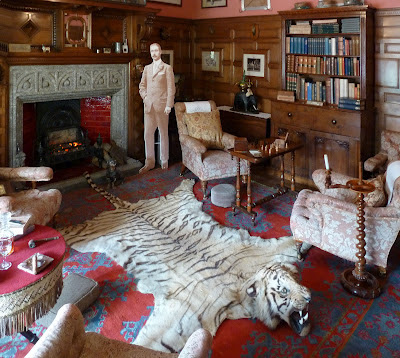Two weeks ago, Red Baron spent a week in Devonshire and Cornwall in the south of England. One of my objectives was to have a conversation with a person from that region, remembering well Professor Higgins' complaint when he met Eliza selling flowers at the Covent Garden Opera:
Why can't the English teach their children how to speak?
This verbal class distinction, by now, should be antique ...
And he continued:
Hear a Yorkshireman, or worse,
Hear a Cornishman converse ...
The bus tour to England's southwest started from a hotel in Heathrow and took our group to historical Plymouth via Stonehenge.
We stopped at Winchester, where its famous cathedral was made known to the younger generation through a 1966 song by the New Vaudeville Band: "
Winchester Cathedral, you're bringing me down." You stood, and you watched as my baby left town.
While humming the tune, a stained glass window on one side of the transept caught my attention. The man on the lower left-hand side, I had seen before. It is
King George VI with his wife,
Elizabeth, who is opposite him, better known as Queen Mum. A guide confirmed my guess and added that
King Henry IV, with his second wife,
Joan of Navarre, is depicted in the two fields above. On February 7, 1403, Henry married Joanna de Navarre, the daughter of Charles d'Évreux, King of Navarre, at Winchester.
Plymouth, the city of Francis Drake, the Mayflower,
and Christian Victor, Prince of Schleswig-Holstein
 |
| The famous Hoe above Plymouth harbor, with lots of people enjoying the sun |
Text on the bronze plate:
Francis Drake sailed from Plymouth on December 13, 1577, to begin the "famous voyage" during which he traversed the Strait of Magellan and discovered the Drake Passage south of Cape Horn. Drake then sailed the Golden Hinde north and in June 1579 landed in California. He took possession of that region for Queen Elizabeth, naming it Nova Albion. He returned to Plymouth on September 26, 1580, having circumnavigated the globe. Drake was knighted aboard the Golden Hinde at Deptford in the presence of Queen Elizabeth on April 4, 1581. Do Californians know that they belong to the Commonwealth of Nations?
Quitting the Hoe where Sir Francis finished his game of bowls before descending to the Plymouth harbor and attacking the Spanish Armada, our group passed a monument with a memorial plate:
This obelisk is erected by Alfred Mosely to the memory of Christian Victor, Prince of Schleswig-Holstein, and to the officers, non-commissioned officers & men of the Gloucestershire, Somersetshire & Devonshire regiments who fell during the Boer War, 1899-1902. A German prince in Her Majesty's service against the Boers?
Well, yes, or somewhat no. The father of Christian Victor, Prince Christian of Schleswig-Holstein-Sonderburg-Augustenburg, fell in love with Princess Helena, daughter of Queen Victoria. She permitted marriage with the proviso that the couple live in Great Britain. So their oldest son, Christian Victor, was educated in England and became known to a broader crowd as the Royal cricketer. His Highness, Prince Christian Victor of Schleswig-Holstein, served in the British Army in Africa. He did not fall in action but died of enteric fever in Pretoria, where he was buried on British soil.
A replica of the Mayflower in Plymouth Harbor. A commemorative plate reads:
On September 6 1620, in the Mayoralty of Thomas Fownes after being "kindly entertained and courteously used by divers friends there dwelling" the Pilgrim Fathers sailed from Plymouth in the Mayflower, in the Providence of God to settle in NEW PLYMOUTH, and to lay the foundation of the NEW ENGLAND STATES. The ancient Cawsey, where they embarked, was destroyed not many Years afterwards, but the Site of their Embarkation is marked by the Stone bearing the name of the MAYFLOWER in the pavement of the adjacent Pier. This Tablet was erected in the Mayoralty of I. T. Bond in 1891, to commemorate their Departure and the visit to Plymouth in July of that Year of several of their Descendants and Representatives.
One of the trip's highlights was visiting
Lanhydrock, the most complete Victorian country house in Cornwall, with its beautiful park and gardens.
The National Trust made the house's interior most attractive for visitors by decorating it with artifacts from the good old days. Sitting around a decorated table ...
... and sipping French water:
Having already discussed the virtues of high beds, I was captivated by this really high one with a hot water bottle and those mysterious fir cones on the steps. I recalled a German myth that fir cones should help father the heirs.
However, this will not work when his Lordship prefers to spend his time in the presence of his trophies from India:
The country house has the most impressive kitchen facilities ...
... with
fromage et dessert prepared on the same table:
Absolute plumbing on a WC with down-piping made from lead:
The decline of English plumbing. The nation that once invented the WC and gave it to the world, such that for sanitary equipment on the continent, the imperial 7/8th of an inch has still not been replaced by a metric thread, now imports faucets from Schiltach in the Black Forest.
It seems that the English adopted the binary system for fines. It is £250 for smoking in the hotel bed at Plymouth:
Increasing by a factor of two for boozing on the sands of St. Michael's Mount:
The fine doubles again for dog poop left behind in the streets of Polperro:
I asked His Lordship about his opinion, but he did not deign to look at me.
*

























































